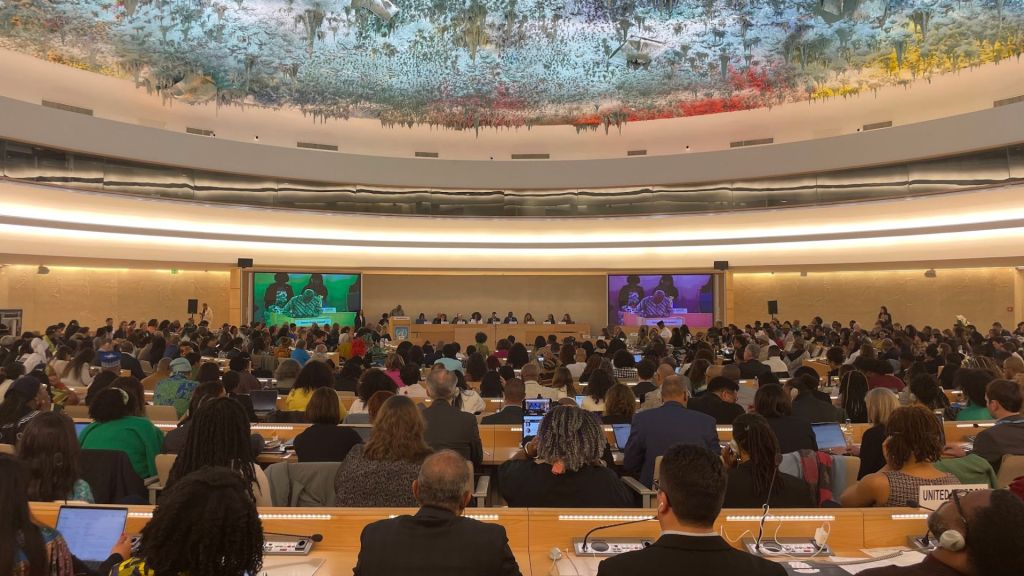By DaQuan Lawrence
AFRO International Writer
DLawrence@afro.com
Members of international society recently convened in Geneva, Switzerland, during the third official meeting of the United Nations (UN) Permanent Forum on People of African Descent.
Held April 16-19 in the Palais des Nations of the United Nations Office in Geneva, the session was convened by the Office of the United Nations High Commissioner for Human Rights (OHCHR).
Under the theme, “The Second International Decade for People of African Descent: Addressing Systemic Racism, Reparatory Justice, and Sustainable Development,” more than 1,000 representatives of civil society from more than 85 countries took part in a week of meetings to develop international policy recommendations for the UN.
“The third session of the Permanent Forum on People of African Descent brings together the United Nations, governments, civil society, human rights defenders and more a critical moment for equality and racial justice,” said UN Secretary General António Guterres in a recorded statement during the opening of the session.
“We celebrate the invaluable achievements and contributions of people of African descent across the range of human endeavor, from political and civil rights struggles around the world, to science, technology, industry, literature, music and all the arts and more,” Guterres said.
The PFPAD consists of 10 members from around the world who are mandated to contribute to the political, economic and social inclusion of people of African descent in the societies in which they live as equal citizens without any kind of discrimination.
“When I was vice-president (of Costa Rica), my government worked a lot to achieve the resolution to approve the Permanent Forum,” member Epsy Campbell Barr told The AFRO.
Campbell Barr served as the inaugural chair of the PFPAD and presided over the first two sessions before her successor, June Soomer of Saint Lucia became chair during the most recent session.
“Now in this third session we have a lot of participation from members of civil society and international governments. More importantly, we have many young people that are participating in this discussion,” Campbell Barr said.
Like previous sessions of the PFPAD, where civil society delegates called for remedies to the TransAtlantic slave trade, colonialism and racism as well as spiritual reparations, the third session continued to highlight the necessity for global recourse for the aforementioned crimes against humanity.
Sharif Shafi, of the DMV Freedom Fighters, traveled to Switzerland after attending the second session of the PFPAD at the UN headquarters in New York City.
“This forum is important for people of African descent to never let atrocities happen again, and we must work together so that we are on one accord,” Shafi said. “We must spend our money on one accord, and we must direct our energy on one accord no matter what language we speak.”
During the session, members of the Forum, civil society delegates and member states discussed mechanisms that could be utilized within international law and public policy to ensure that national governments and businesses respect, protect and uphold the human rights of people of African descent.
At the conclusion of the session Special Rapporteur for the PFPAD, Michael McEachrane, announced the forum’s preliminary recommendations for the UN and member states, which include:
- Eliminating the veto power of permanent members of the UN Security Council and adding an African permanent member to the body;
- Ensuring a comprehensive program of reparatory justice to eliminate the vestiges of enslavement and colonialism;
- Promoting global reforms to address anti-Black racism in debt, education, banking, transportation, and migration;
- Establishing an international tribunal to adjudicate reparations claims and quantify remedies.
Included in the preliminary recommendations, were also policy suggestions such as:
- Prioritizing reparatory justice and restitution for Haiti;
- Ensuring equal access to quality education and decolonizing curricula;
- Upholding the Durban Declaration and Programme of Action’s acknowledgment of enslavement as a crime against humanity;
- Recognizing the right of return and diasporic citizenship for Afro-descendants; and
- Removing and replacing monuments to enslavement and other atrocities.
As members of the forum and the attending delegates focused on the UN establishing a second decade for people of African descent, the top UN official noted the need for comprehensive solutions to issues that stem from centuries of injustices.
“Racial discrimination and inequality continue based on centuries of enslavement and colonialism. By establishing this Permanent Forum, the international community demonstrated its commitment to addressing these injustices,” Guterres said.
“Now we must build on that momentum to drive meaningful change, by ensuring that people of African descent enjoy the full and equal realization of their human rights.”
The post 3rd session of Permanent Forum on People of African Descent convenes in Geneva appeared first on AFRO American Newspapers.











